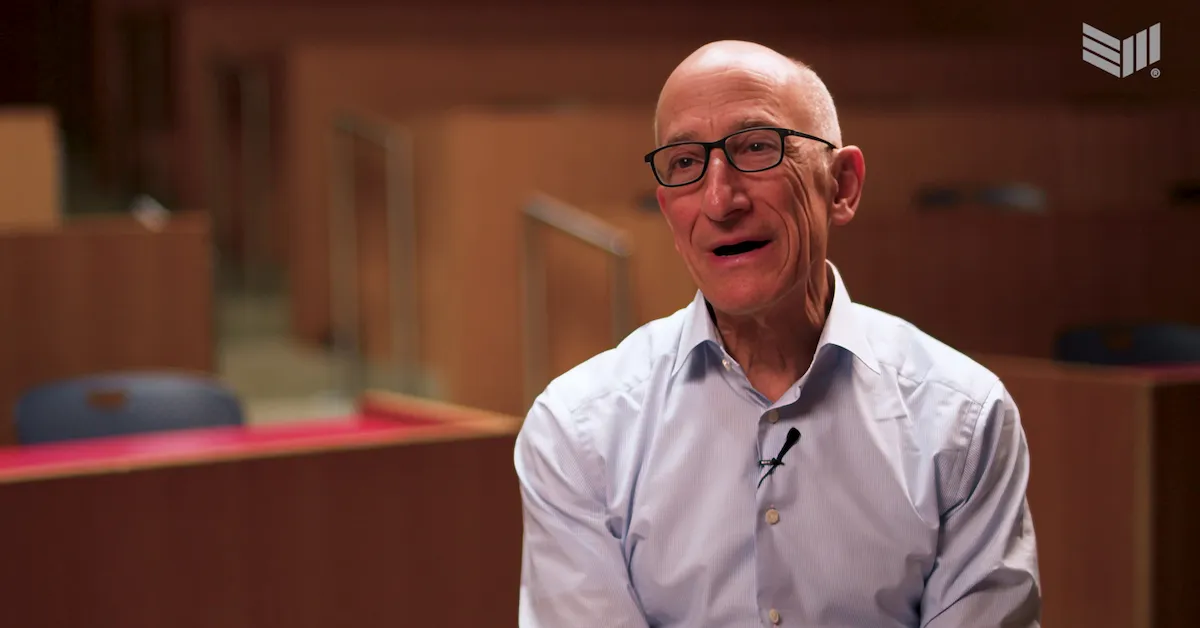CFTC
Former CFTC Chairman Timothy Massad On Bitcoin And Digital Asset Privacy
Published
2 weeks agoon
By
admin
While attending the MIT Bitcoin Expo this past weekend, I was afforded the opportunity to sit down with Timothy Massad, Research Fellow at the Kennedy School of Government at Harvard University and former Chairman of the U.S. Commodities and Futures Trading Commission (CFTC).
Massad served as the head of the CFTC from 2014 to 2017, and it was under his leadership that bitcoin was classified as a commodity.
In recent years, Massad has shared his thoughts on what regulation around bitcoin and digital assets should look like. He’s appeared on Bloomberg to discuss the matter, and he recently testified at the first Senate Banking Subcommittee hearing on Digital Assets.
Massad considers the need to balance user privacy when using public blockchains with the need for the U.S. government to monitor the networks for illicit activities as one the biggest challenges that regulators currently face — and he doesn’t claim to have the answer as to how this is best accomplished.
He explained that it’s important that people cannot see the balance of our funds or the entirety of our transaction history when we do something as trivial as paying for a cup of coffee with a digital asset.
In our conversation, he stated that the innovator who develops the technology that finds this balance will have found the “holy grail.”
You can watch the interview here:
Source link
You may like


XRP Price Shows Strength — Breakout Above Key Levels Possible?


Expert Reveals Why The Ethereum-To-Bitcoin Ratio Is Falling


Analyst Says Solana-Based Memecoin Going Much Higher, Sees PENGU Facing ‘True Test’ After April Surge


Nike sued for $5 million over its shutdown of NFT platform RTFKT


Biological Age vs. Chronological Age: Redefining Age in the Digital Era


TRUMP whale regrets sale, pays double to buy back meme coins
CFTC
CFTC Welcomes Public Comments on 24/7 Trading – Acting Chairman Says Agency Must Take ‘Forward-Looking’ Approach
Published
5 days agoon
April 23, 2025By
admin
The Commodity Futures Trading Commission (CFTC) is asking the public to comment on the idea of allowing round-the-clock trading in derivatives markets.
In a statement, the federal agency, which regulates the derivatives markets, says it is exploring the possibility of 24/7 trading to keep up with shifting financial trends.
Says Acting Chairman Caroline Pham,
“As I have long said, the CFTC must take a forward-looking approach to shifts in market structure to ensure our markets remain vibrant and resilient while protecting all participants. One evolving trend is the move to 24/7, 24/6, or 24/5 trading hours. I look forward to the public comments on this market innovation.”
The agency is specifically seeking comments on the effects and risks of permitting trading at all hours of the day.
“This request seeks comment on the implications of extending the trading of CFTC-regulated derivatives markets to an effectively 24/7 basis, including the potential effects on trading, clearing and risk management which differ from trading during current market hours. The request also seeks comment on the risks of 24/7 trading, and the associated clearing systems, including risks related to the areas of market integrity, customer protection or retail trading.”
The agency will receive public comment until May 21st.
Follow us on X, Facebook and Telegram
Don’t Miss a Beat – Subscribe to get email alerts delivered directly to your inbox
Check Price Action
Surf The Daily Hodl Mix
 

Disclaimer: Opinions expressed at The Daily Hodl are not investment advice. Investors should do their due diligence before making any high-risk investments in Bitcoin, cryptocurrency or digital assets. Please be advised that your transfers and trades are at your own risk, and any losses you may incur are your responsibility. The Daily Hodl does not recommend the buying or selling of any cryptocurrencies or digital assets, nor is The Daily Hodl an investment advisor. Please note that The Daily Hodl participates in affiliate marketing.
Generated Image: Midjourney
Source link
CFTC
Senator Tim Scott Says Crypto Market Structure Bill To Be Passed by August of This Year
Published
2 weeks agoon
April 14, 2025By
admin
Republican Senator Tim Scott of South Carolina says a bill seeking to create a comprehensive regulatory framework for the digital asset space will become law later this year.
In a new interview with Fox News, Scott, the chairman of the Senate Committee on Banking, Housing, and Urban Affairs, says a bill that will help crypto firms thrive and innovate is set to be passed later this year, countering the last regime’s stance on digital assets.
“There’s no doubt that under the Biden Administration and [Chairman Gary] Gensler at the SEC – they just didn’t like crypto. What I’ve said very often is simply this: we must innovate before we regulate. That means allowing innovation to happen here at home in the digital assets space is critical to American economic dominance across the globe.
The good news is President Trump is leading the way to a crypto revolution starting here at the Banking Committee. And that’s why we’ve moved very quickly the GENIUS Act… It’s passed through my Committee in a bipartisan fashion. Next [is] market structure…I believe [it will be] passed into law by August.”
The Genius Act, which establishes regulations for stablecoins, is headed to the Senate floor for a vote after the Senate Banking Committee approved the bill with a bipartisan vote of 18-6.
While Scott says a bill to establish a crypto market structure is next, he didn’t mention any specific piece of legislation.
However, one bill that fits the mold is the Digital Asset Market Structure and Investor Protection Act, which would give the Commodities Futures Trading Commission (CFTC) regulatory power over digital assets while handing the U.S. Securities and Exchange Commission (SEC) the authority to oversee digital asset securities.
Follow us on X, Facebook and Telegram
Don’t Miss a Beat – Subscribe to get email alerts delivered directly to your inbox
Check Price Action
Surf The Daily Hodl Mix
 

Disclaimer: Opinions expressed at The Daily Hodl are not investment advice. Investors should do their due diligence before making any high-risk investments in Bitcoin, cryptocurrency or digital assets. Please be advised that your transfers and trades are at your own risk, and any losses you may incur are your responsibility. The Daily Hodl does not recommend the buying or selling of any cryptocurrencies or digital assets, nor is The Daily Hodl an investment advisor. Please note that The Daily Hodl participates in affiliate marketing.
Generated Image: Midjourney
Source link
CFTC
The CFTC just pulled the plug on Robinhood’s Super Bowl bets—Here’s why
Published
3 months agoon
February 5, 2025By
admin

Less than a day after launching Super Bowl betting contracts, Robinhood shut them down at the CFTC’s request.
On Feb. 4, Robinhood pulled the plug on its Super Bowl betting contracts just a day after launch, following a request from the U.S. Commodity Futures Trading Commission.
The Commodity Futures Trading Commission (CFTC) has formally requested that Robinhood Derivatives, LLC (RHD) “not permit customers to access” sports event contracts.
While we continue to work with the CFTC to understand their concerns, we are suspending the rollout of the Pro…
— Robinhood Comms (@RobinhoodComms) February 4, 2025
The move comes as regulators grow increasingly wary of event-based trading products, particularly those tied to major sporting events.
The product, launched in partnership with prediction market platform Kalshi, allowed users to bet on the outcome of the Feb. 9 Super Bowl matchup between the Philadelphia Eagles and the Kansas City Chiefs.
Only about 1% of Robinhood’s customers had access to the contracts before they were suspended. Those who had already placed bets will be able to either close their positions or see them through to settlement, but no new trades will be allowed.
Robinhood, frustrated with the turn of events, stated in a tweet that it had been in “regular communication” with the CFTC about its plans and was disappointed by the outcome.
The company did not disclose the exact reasoning behind the CFTC’s intervention, but the decision comes amid broader regulatory scrutiny of event-based contracts.
Just two days ago, the agency launched an inquiry into Crypto.com and Kalshi, questioning whether their own Super Bowl contracts complied with derivatives laws.
Robinhood isn’t new to event-based trading. In October 2024, the company made its first move into the space with contracts tied to the outcome of the U.S. presidential election.
That launch followed a court ruling in favor of Kalshi, which had challenged the CFTC’s attempts to block election-based prediction markets.
The legal victory allowed Kalshi to continue offering election contracts, but it did little to resolve the regulatory gray area surrounding event-based derivatives.
A CFTC spokesperson reinforced its concerns, stating that it will “exercise its oversight authority to the fullest extent” to ensure firms comply with derivatives laws, Reuters reported.
The agency is taking a hard look at whether these products fall under traditional derivatives rules or if they should be treated as a different class of financial instruments.
For Robinhood, this latest hurdle may not mark the end of its push into the space. The company has indicated plans to launch a more expansive event contracts platform later this year, signaling that it still sees opportunity in the market.
Source link

XRP Price Shows Strength — Breakout Above Key Levels Possible?

Expert Reveals Why The Ethereum-To-Bitcoin Ratio Is Falling

Analyst Says Solana-Based Memecoin Going Much Higher, Sees PENGU Facing ‘True Test’ After April Surge

Nike sued for $5 million over its shutdown of NFT platform RTFKT

Biological Age vs. Chronological Age: Redefining Age in the Digital Era

TRUMP whale regrets sale, pays double to buy back meme coins

Stripe Tests New Stablecoin Project as $3.7T Market Looms

Falling Wedge Pattern Confirms $264 target
Dogecoin Confirms Daily Trend Reversal With Breakout, Retest, And New Uptrend

Ethereum community members propose new fee structure for the app layer

Crypto Investors Sue Nike, Accuse Apparel Giant of Rug Pull After Abrupt Closure of Metaverse Business: Report

Top cryptocurrencies to watch: Pi Network, XRP, Sui

This Week in Crypto Games: Ubisoft’s ‘Might & Magic’, ‘Peaky Blinders’ in Development

Why Arbitrum-Nvidia Partnership Collapsed – And What It Means for Web3

Tariff Carnage Starting to Fulfill BTC’s ‘Store of Value’ Promise

Arthur Hayes, Murad’s Prediction For Meme Coins, AI & DeFi Coins For 2025

Expert Sees Bitcoin Dipping To $50K While Bullish Signs Persist

3 Voting Polls Show Why Ripple’s XRP Price Could Hit $10 Soon

Aptos Leverages Chainlink To Enhance Scalability and Data Access

Bitcoin Could Rally to $80,000 on the Eve of US Elections

Crypto’s Big Trump Gamble Is Risky

Institutional Investors Go All In on Crypto as 57% Plan to Boost Allocations as Bull Run Heats Up, Sygnum Survey Reveals

The Future of Bitcoin: Scaling, Institutional Adoption, and Strategic Reserves with Rich Rines

Sonic Now ‘Golden Standard’ of Layer-2s After Scaling Transactions to 16,000+ per Second, Says Andre Cronje

Ripple-SEC Case Ends, But These 3 Rivals Could Jump 500x

Has The Bitcoin Price Already Peaked?

A16z-backed Espresso announces mainnet launch of core product

Xmas Altcoin Rally Insights by BNM Agent I

Blockchain groups challenge new broker reporting rule

I’m Grateful for Trump’s Embrace of Bitcoin
Trending

 24/7 Cryptocurrency News6 months ago
24/7 Cryptocurrency News6 months agoArthur Hayes, Murad’s Prediction For Meme Coins, AI & DeFi Coins For 2025

 Bitcoin3 months ago
Bitcoin3 months agoExpert Sees Bitcoin Dipping To $50K While Bullish Signs Persist

 Ripple Price1 month ago
Ripple Price1 month ago3 Voting Polls Show Why Ripple’s XRP Price Could Hit $10 Soon

 24/7 Cryptocurrency News4 months ago
24/7 Cryptocurrency News4 months agoAptos Leverages Chainlink To Enhance Scalability and Data Access

 Bitcoin6 months ago
Bitcoin6 months agoBitcoin Could Rally to $80,000 on the Eve of US Elections

 Opinion6 months ago
Opinion6 months agoCrypto’s Big Trump Gamble Is Risky

 Bitcoin5 months ago
Bitcoin5 months agoInstitutional Investors Go All In on Crypto as 57% Plan to Boost Allocations as Bull Run Heats Up, Sygnum Survey Reveals

 Bitcoin3 months ago
Bitcoin3 months agoThe Future of Bitcoin: Scaling, Institutional Adoption, and Strategic Reserves with Rich Rines


